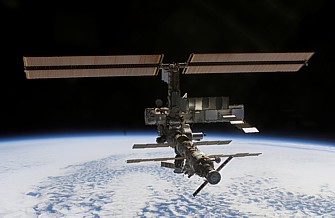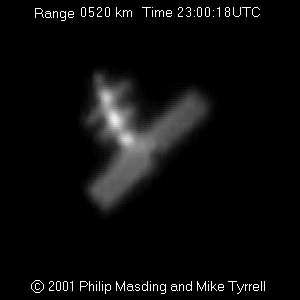Daniel Tarr
Mystery Space Machines
by John Lenard Walson
- A Review -
2008.
John Lenard Walson presents » F.A.S.T. - Fast Above Space and Time

It seems that some of the stars above us are not stars at all...
In 2007 a John Lenard Walson has invented a new gadget capable of extending his amateur telescope resolution. The new way to extend the capabilities of his eight inch Meade telescope to shoot his videos has enabled him to achieve optical resolutions - at almost the diffraction limit - not commonly achievable. The discovery was first publicized by Jeff Rense at “Mystery Space Machines Above. Black Ops, Star Wars Or ET? Or All Of The Above?” in December 2007.
Walson claims he could film not only the International Space Station (ISS), but that he discovered that many "stars" in the sky are in fact HUGE structured objects - giant machines are “fixed” in the sky. With this new-found ability, he has proceeded to videotape, night and day, many strange and heretofore unseen objects in earth orbit. Walson claims that he can record them in plain daylight at noon and that he can record sounds from the machines in space. The resulting astro-photographic video footage has revealed a raft of machines, hardware, satellites, spacecraft and possibly space ships which otherwise appear as 'stars'... if they appear at all.
Photographing the International Space Station (ISS) and satellites was proved possible and this may support Walson’s finds. You can read this article on the NYT about amateur enthusiasts who actually track and image orbiting objects. Also see Excerpt from BBC's "The Satellite Story" on the subject matter about By Mike Tyrrell and Phil Masding. More amazing shots of the ISS by Mike Tyrrell and Phil Masding can be seen on Tyrell’s website.
In my opinion the imagery of Walson does not look any much different from Tyrell's images:

Image by NASA |
|
 |
|

Image by John Lenard Walson |
See more » International Space Station (ISS) photos | See my » Planet Earth Photo Gallery
The discovery has been of great debate and controversy ever since with convincing evidence on both sides. Debunkers like forgetomori argue that the technology of the video recording was not revealed and the images are hoaxes since it is possible to reproduce very similar images. In fact, “waveguide3″ suggests he recreated the videos using models made with aluminum foil, shot at a distance and distorted with mirrors and glasses.

Are We Supposed To Be Seeing These Things?
What is John Lenard Walson videotaping with his proprietary telescope videocam technique? Are these just satellites and space junk? Or, are we seeing large and very sophisticated spacecraft for the first time that we AREN'T supposed to see? Walson received the following comment about one of the videos:
"Hello again. And, again, my congratulations on your superb astrophotography.
MIT Lincoln Laboratory is the group which has built some of the things you are seeing. Much of what they do is what used to be the Star Wars project, which no doubt involves some of your objects."
Maybe some of Walson's images ARE of sensitive, secret US military Star Wars machines. Maybe even 'secret' weapons platforms in space, which the US military has been rumored to have for at least 20 years. It's clear the major space powers are far more heavily-invested in space than they will admit. As a reflection of that reality, there has been a lot of recent talk about 'anti-satellite' weapons 'needed' by competing countries to 'protect themselves.' Most recently, China has been discussing its anti-sat programs and even threatened to destroy or disable all GPS satellites which over-fly Chinese territory. It's anyone's guess how many billions the US military and government have poured into black ops NASA-facilitated programs of 'secret' spying and surveillance programs, and military space weapons systems over the decades.
John Lenard Walson's video images and sounds may well show some of these advanced machines. So , what you see could be spacecrafts, and maybe even space ships, parked or stationed in orbit above the Earth. It is also within the realm of possibility some of these items might be products of non-human intelligence.
There is much more to the John Lenard Walson story...

Let's start with one such object in orbit as videotaped by John Lenard Walson. Once again, here is what the ISS looks like through the telescope and video camera lens of astro-photographer Walson... It is the International Space Station... the ISS... take a look... Keeping that image and it's relative size appearance in mind, now ask yourself, what is THIS?
|
International Space Station (ISS) |
Space Machine |
And here is the actual video footage from which the above freeze frame is taken followed by some footage of something that is NOT the ISS:
The International Space Station ISS October end 2007
If you might be wondering what the Space Shuttle and a Satelite looks like, here it is:
So, what are these other huge machines and spacecrafts?:

And if you find these images intriguing, here are many more examples of the scores of space objects above us John Lenard Walson has captured on video:
» F.A.S.T. - Fast Above Space and Time | » YouTube - Gridkeeper | » YouTube - John Lenard Walson
To view these spacecrafts on video, please visit John Lenard Walson's video collections:
» F.A.S.T. - Fast Above Space and Time | » YouTube - Gridkeeper | » YouTube - John Lenard Walson

There are indeed hundreds of satellites in Earth orbit as you will read in the summary which follows. It is also possible to track these machines. (See: Real Time Satellite Tracking.) However, the images you see are clearly of large and sizeable machines which have not been seen before.
According to the Union Of Concerned Scientists about orbiting spacecraft and satellites in Earth orbit:
- There are more than 800 active satellites currently in orbit.
- Amazingly, they represent four percent of the total number of objects currently cataloged by the U.S. space surveillance network; the rest includes abandoned satellites, spent rocket boosters, and other debris.
- The United States owns more than 400 active satellites, just over 50 percent of all satellites.
- Russia and China have the second and third highest number of space assets, owning 89 and 35 satellites, respectively.
- Civilian satellites, which perform tasks for the commercial, scientific, and government sectors, make up the majority of U.S. satellites.
- Russia's space assets are split nearly evenly between military and civil missions, though there are not separate military and civilian space programs.
- Only a very small percentage of other countries' satellites are military in nature.
Satellites are used for:
- navigation
- military surveillance
- Earth observation and remote sensing
- astrophysics and space physics
- Earth science and meteorology missions,
...each comprise about five to seven percent of total satellites. Approximately two-thirds of all active satellites are used for communications.
Satellites orbit Earth in several distinct regions of space:
- Low Earth orbits (LEO) - about 80 kilometers (km) to 2000 km above Earth. Includes:
- military intelligence satellites
- weather satellites
- Geosynchronous orbits (GEO) - 36,000 km above Earth. Includes:
- commercial and military communications satellites
- satellites providing early warning of ballistic missile launch
- Medium Earth orbits (MEO) - between LEO and GEO. Includes:
- navigation satellites (Navstar, Glonass)
- Molniya orbit - a highly elliptical orbit with a 12-hour period. Includes:
- communication satellites for regions near the North Pole
Orbital Debris
Orbital debris is any human-made object in orbit that no longer serves a useful purpose, including discarded equipment, abandoned satellites, bolts and other hardware released during satellite deployment, and particles from explosions or collisions. The table below gives current estimates of orbital debris in three size categories. As the table shows, approximately 40 percent of all orbital debris larger than one millimeter in size is in LEO. Large numbers of naturally occurring particles ("meteoroids") add to the total number of orbital objects less than one centimeter in size, but are not included in this table.
|
Estimates of Orbital Debris
Average Size |
Pieces LEO Debris |
Total Pieces Of Debris |
1 mm - 1 cm |
140,000,000 |
330,000,000 |
1 cm - 10 cm |
180,000 |
560,000 |
> than 10 cm |
9,700 |
18,000 |
Source: Klinkrad, H. 2006.
Space debris: Models and risk analysis. Berlin: Springer Praxis, 96.
http://www.ucsusa.org/global_security/space_weapons/whats-in-space.html
|
Clearly, what we see are none of the above...

For further explanation please visit the original site archive at
» Rense.com - Strange Things Above
» Biblioteca Pleyades.net archive
» Ufology - SOHO Satelite "Solar UFOs"
YOUR support keeps this site running. Thank you!
(A TE támogatásodra is szükség van!)